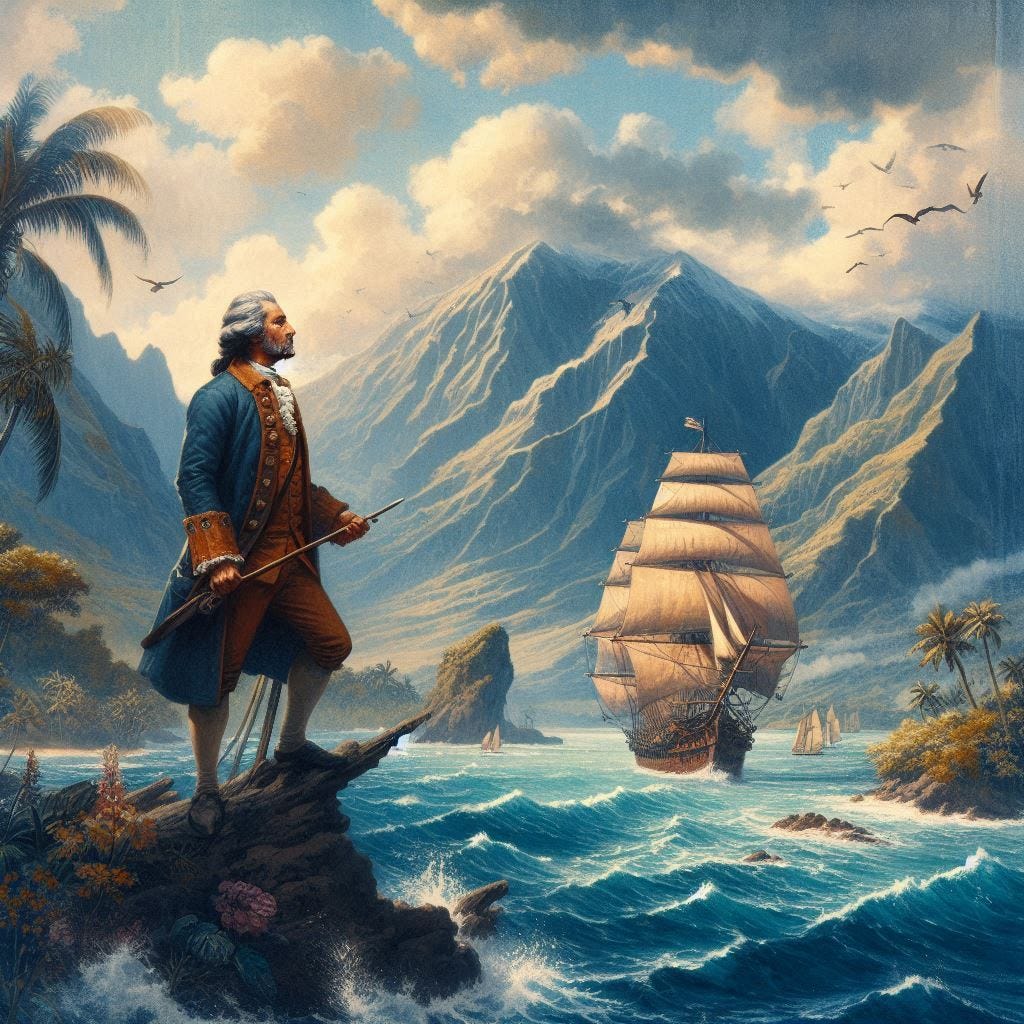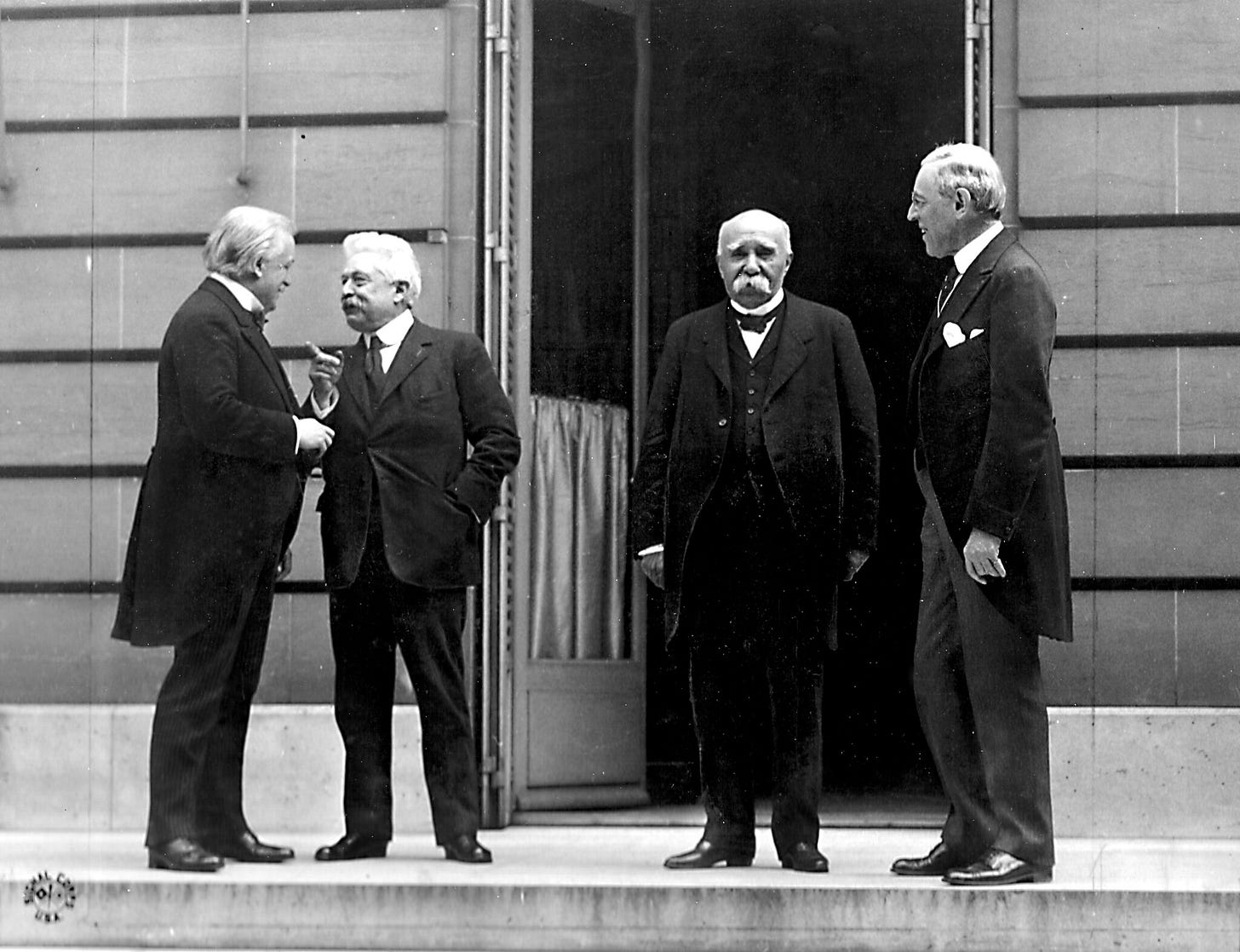The Mysteries of History (January 18 Edition)
Captain Cook in Hawaii, Paris Peace Conference, and a Star is Born
1778 — Captain Cook Discovers Paradise at His Peril
Dateline January 18, 1778 (during the American Revolution): Captain James Cook “discovers” the Hawaiian islands (meaning he was the first European known to travel to those South Pacific islands). He named them the Sandwich Islands for one of his sponsors (financial backers), John Montague, the Earl of Sandwich.
On a side note, Mark Twain once wrote of that august personage:
Wherever they can stick a name so that it shall glorify anything pertaining to England, there they stick it. You never hear of an Englishman speak of the Hawaiian Islands--no, he calls them the Sandwich Islands; Cook discovered them second-hand, by following a Spanish chart three hundred years old, which is still in the British Museum, and named them for some one-horse Earl of Sandwich, that nobody had heard of before, and hasn't since--a man that probably never achieved any work that was really gorgeous during his earthly mission, excepting his invention for confining a slice of ham between two slices of bread in such a manner as to enable even the least gifted of our race to eat bread and meat at the same time, without being bewildered by too elaborate a conjunction of ideas.Anyway, back to the main topic: Cook and his men were initially viewed as gods by the natives and treated as such, but when the Hawaiians realized on a subsequent visit in 1779 that the British sailors were mere mortals, they were no longer hospitable to them (to say the least), and Cook was killed by an angry mob of islanders.
Questions: Where had Cook gone on previous voyages? What is an Earl? What connection is there between John Montague and sandwiches, the common lunch item?1919 — Paris Peace Conference Begins
public domain (wikimedia commons) candid photo taken on May 27, 1991 at the 1919 Paris Peace Conference of, from left to right, British Prime Minister David Lloyd George, Italian Prime Minister Vittorio Emanuele Orlando, French Premier Georges Clemenceau, and U.S. President Woodrow Wilson
As the “Great War” (subsequently renamed World War 1 when World War 2 [I hate Roman numerals] began) reached its merciful conclusion, the main leaders of four major countries (England, America, France, and Italy) met in Paris to hammer out the details of how the peace was to be prosecuted. U.S. President Woodrow Wilson’s idea was “peace without victory,” angling to not punish Germany too harshly. This idea was rejected by the representatives of Britain (George) and France (Clemenceau). Wilson finally acquiesced in order to keep alive his dream of creating the League of Nations, with the intent of preventing any further wars of this magnitude from occurring.
Questions: Which war did Wilson remember from his childhood? How did German representatives to the Peace Conference (only allowed to participate once a deal had been hammered out) feel about the conditions mandated upon them? What connection is there between forcing Germany to cede land and pay reparations and the second World War? Which Pulitzer-Prize-winning novel features a protagonist named Woodrow (hint: he has a friend named Gus, and the book was made into a mini-series)?1975 — Barry Manilow’s “Mandy”
public domain image from wikimedia commons
Bland American crooner (Frank Sinatra said of him, “He’s next”) hit the big time on this date in 1975 when his song Mandy reached #1 on the Billboard charts. The song was not written by Manilow, even though one of his other hit songs was named “I Write the Songs” (he didn’t write that one, either; it was a cover of a Captain and Tennille song written by Bruce Johnston).
The person who did write Mandy, Scott English, initially hated Manilow’s version of it because Manilow chopped out part of a verse and made it into a bridge, but English later changed his mind and loved Manilow’s rendition. Why the shift in perspective? Because English was able to purchase houses with the proceeds earned from the song’s royalties (perhaps he thought he lived like royalty thereby, similar to Merle Travis changing “I owe my soul to the company store” to “I owe my soul to Tennessee Ernie Ford” when performing his song Sixteen Tons after Ford had earned him a fortune with his recording of it).
In my opinion (whose else would I give?), Me First and the Gimme Gimmes did a far better version of Mandy than Manilow did. You can hear their version of it here.
Questions: Why was Manilow born Barry Pincus, although his mother was Edna Manilow and his father was Harold Kelliher? Before making it big as a solo act, for whom did Manilow play piano? Who are Me First and the Gimme Gimmes, and from what did they get their name?








